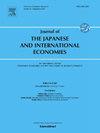The transmission of monetary policy shocks: Evidence from Japan
IF 3.1
3区 经济学
Q1 ECONOMICS
Journal of the Japanese and International Economies
Pub Date : 2024-12-18
DOI:10.1016/j.jjie.2024.101349
引用次数: 0
Abstract
Following Miranda-Agrippino and Ricco (2021), we identify a monetary policy shock in Japan. We construct this shock to be orthogonal to the Bank of Japan’s macroeconomic forecasts, as well as a central bank’s information shock (Nakamura and Steinsson, 2018). Our findings indicate that a surprise policy tightening is contractionary, leading to a deterioration in output and decline in prices. There are no lagged effects of monetary policy on inflation. In response to a tightening shock, prices fall immediately. Furthermore, we demonstrate that a positive central bank information shock increases both output and prices. An unexpected positive outlook from the Bank of Japan raises stock prices and depreciates the Japanese yen. This evidence suggests that information effects play a crucial role in the Japanese economy, even under the effective lower bound.
货币政策冲击的传导:来自日本的证据
在Miranda-Agrippino和Ricco(2021)之后,我们确定了日本的货币政策冲击。我们将这种冲击构建为与日本央行的宏观经济预测以及央行的信息冲击正交(Nakamura和Steinsson, 2018)。我们的研究结果表明,意外的政策收紧是收缩性的,导致产出恶化和价格下跌。货币政策对通货膨胀没有滞后效应。作为对紧缩冲击的回应,价格立即下跌。此外,我们证明了积极的央行信息冲击会增加产出和价格。日本央行出人意料的乐观前景推高了股价,日元贬值。这一证据表明,信息效应在日本经济中起着至关重要的作用,即使在有效下限之下也是如此。
本文章由计算机程序翻译,如有差异,请以英文原文为准。
求助全文
约1分钟内获得全文
求助全文
来源期刊
CiteScore
5.10
自引率
6.90%
发文量
36
期刊介绍:
The Journal of the Japanese and International Economies publishes original reports of research devoted to academic analyses of the Japanese economy and its interdependence on other national economies. The Journal also features articles that present related theoretical, empirical, and comparative analyses with their policy implications. Book reviews are also published.

 求助内容:
求助内容: 应助结果提醒方式:
应助结果提醒方式:


